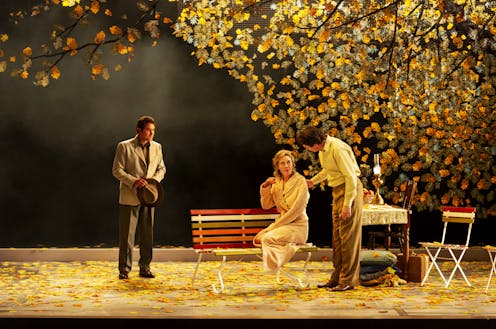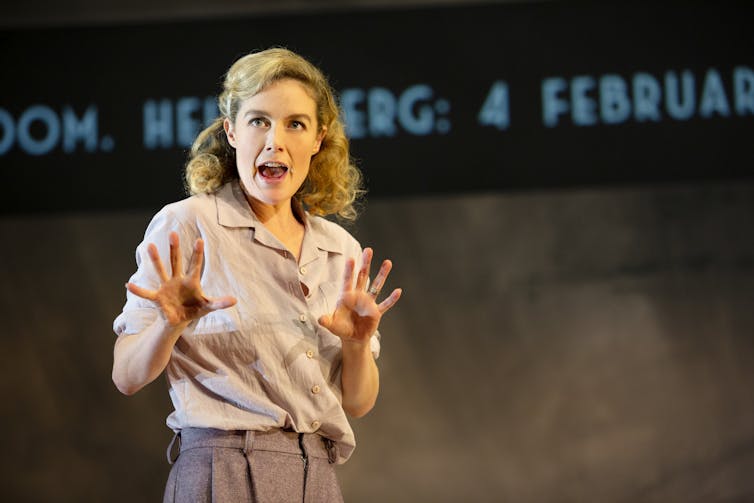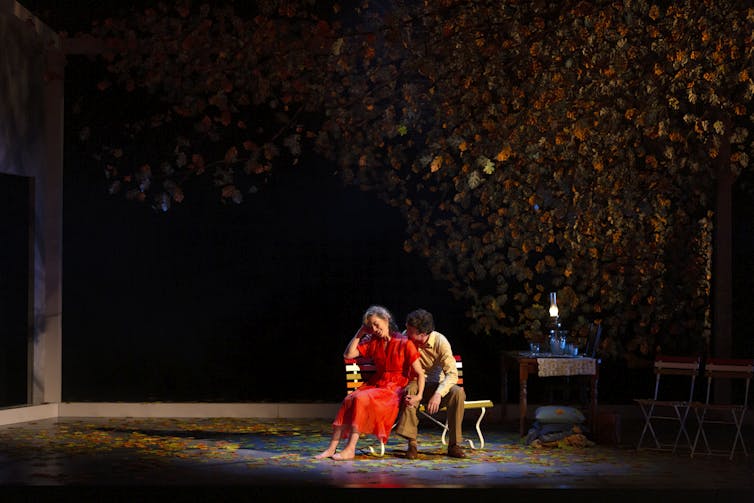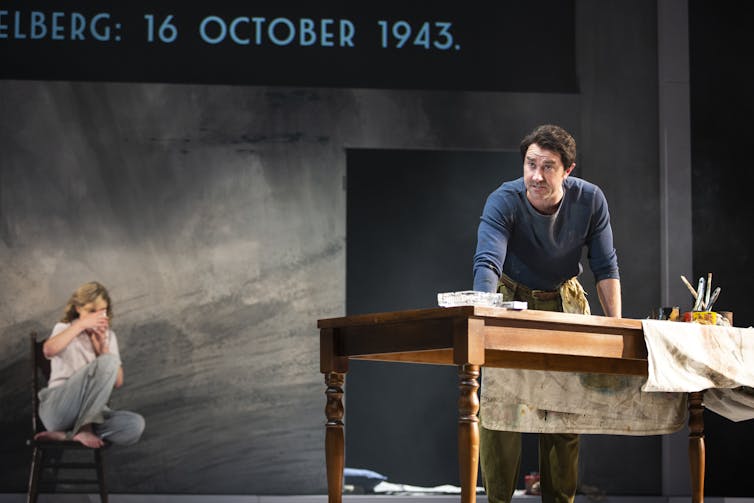Source: The Conversation (Au and NZ) – By Kate Hunter, Lecturer in Art and Performance, Deakin University

Pia Johnson/Melbourne Theatre Company
Review: Sunday, directed by Anne-Louise Sarks, Melbourne Theatre Company
Sunday is a glimpse into the private world of the philanthropist and art patron Sunday Reed.
Sunday, born into the privileged Baillieu family, was a mobilising force in the revolutionary literary and art movement that became the Angry Penguins.
Structured around a loose interpretation of Sunday’s fractured menage à trois with painter Sidney Nolan and her husband, arts editor John Reed, the play unfolds the story of an unconventional, impulsive and passionate woman whose sheer force of character and talent for recognising and cultivating artistic brilliance helped forge the Modernist movement in mid-century Melbourne.
Set in the Reeds’ home and garden at Heide (later to become the Heide Museum of Modern Art), the play has a solid ensemble cast and a sleek and polished production design.
Fragmented scenes shift backwards and forwards through time to build an absorbing picture of the circle of artists who gathered around the Reeds, largely through Sunday’s determination to resist the constrained social conventions that pervaded Melbourne society at that time.
Read more:
Friday essay: the Melbourne bookshop that ignited Australian modernism
An artistic evolution
Characterised by a kind of quick-witted, Dorothy Parker-style dialogue which rollicks along, the play is enjoyably parochial in its depiction of characters who played such a crucial role in Australia’s – and Melbourne’s – artistic evolution.
The Reeds’ house and garden at Heide became a central focus for a bohemian and unconventional lifestyle, complete with gatherings, events, arguments and love triangles, which fostered the careers of key Australian artists such as Albert Tucker, Joy Hester, Arthur Boyd and John Perceval.
Sunday (Nikki Shiels) was a champion of the particular light the Australian landscape holds: the whites, the greens. Anthony Weigh’s dialogue crackles with in-jokes about the artistic, cultural and economic differences between Melbourne and Sydney.

Pia Johnson/Melbourne Theatre Company
Shiels delivers a strident, sassy and vulnerable performance as Sunday Reed. Relaxed and confident, with a lithe physicality, Shiels is self-possessed and specific.
Josh McConville as Sidney Nolan unnerved me at first – he wasn’t at all how I imagined Nolan to be – but his comic timing and diffident, understated likeability grows as the play progresses.
John Reed (Matt Day) gives us a long, detailed critique of the old-boy/girl network, still rife in Melbourne. But his performance feels at odds with the rest of the production: his folksy, wholesome delivery undercuts Shiels’ more centred and dropped-in performance.
Beautiful design
This is a beautiful-looking, pared-back production.
Anna Cordingley’s striking chiaroscuro-washed set in grey tones is edged by a three-sided frame which holds the theatrical images. No fiddly doilies or busy prop-ridden scenes distracted from the action in this slickly-designed work.

Pia Johnson/Melbourne Theatre Company
Signature set pieces descend from the rig or rise through the floor. A single window, a sparkling chandelier, a clawfoot bath: these hint at places and spaces with a beautifully minimalist aesthetic.
The reduced palette is also delightfully manifested in Harriet Oxley’s specific and considered costume design.
The epic sound design by Jethro Woodward is a major player in the work. Birds, bells, synthetic harmonics and low tones are juxtaposed with wild jazz and drums, signifying shifts in time and place. Surtitles assist us to navigate the non-linear trajectory.
Endearing and entertaining
At times, despite the rapid-fire pace of the play (which cracked along for three hours), I found myself craving a deeper engagement with the material: the cloying gender politics of dour 1940s Melbourne; the shifting and complex power structures that underpin the art world.
The play turns a little darker over time as the complex relationships between the characters break down or explode, but the transformation of Sunday’s character from cheerful and witty in act one to desperate and cloying after the interval feels a little unresolved.
Sunday raises important questions about the nature of artistic authorship and the role of the benefactor as facilitator and enabler. Would Sidney Nolan have become the artist he became if not for Sunday Reed?

Pia Johnson/Melbourne Theatre Company
These issues are just as relevant now in the increasingly competitive world of contemporary art. But the comedic style of Sunday undermines the potential for a deeper set of considerations that might draw this work into a more contemporary discussion.
Ultimately, however, Sunday is an endearing and entertaining work which is a very Melbourne story. It is an imaginative unfolding of a life, resonating with iconic characters that are embedded in the cultural history of the city.
Read more:
On Sidney Nolan, the painter who re-envisaged the Australian landscape
![]()
Kate Hunter does not work for, consult, own shares in or receive funding from any company or organisation that would benefit from this article, and has disclosed no relevant affiliations beyond their academic appointment.
– ref. An imaginative unfolding of a life, a new play asks: would Sidney Nolan have become the artist he became if not for Sunday Reed? – https://theconversation.com/an-imaginative-unfolding-of-a-life-a-new-play-asks-would-sidney-nolan-have-become-the-artist-he-became-if-not-for-sunday-reed-196797






